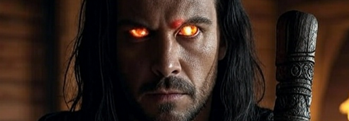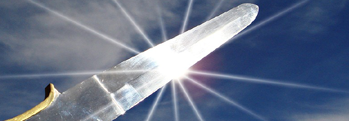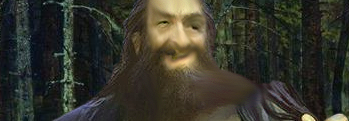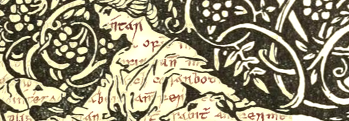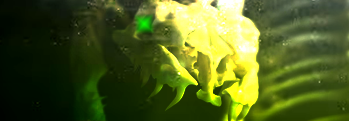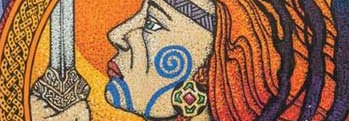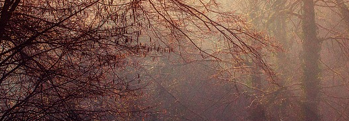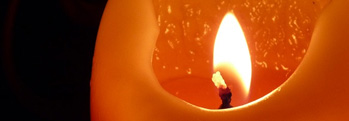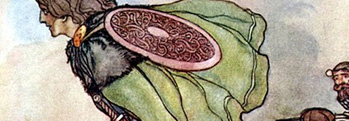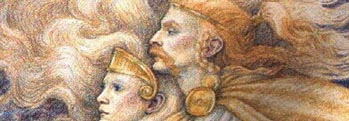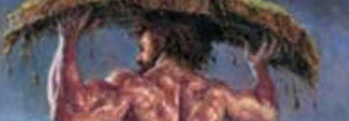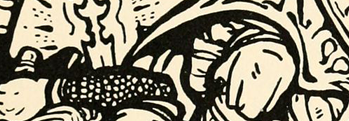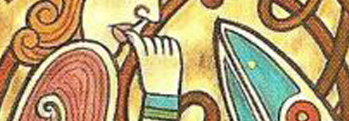The Hunt of Slieve Cuilinn
Irish and Celtic myths and legends, Irish folklore and Irish fairy tales from the Fenian Cycle
The Hunt of Slieve Cuilinn where Fionn got his white hair
Fionn MacCumhaill was well known as a fair and handsome man, but his most distinguishing feature was his grey hair - and he was not born with it!
Fionn was one time out on the green of Almhuin, and he saw what had the appearance of a grey fawn running across the plain. He called and whistled to his hounds then, but neither hound nor man heard him or came to him, but only Bran and Sceolan. He set them after the fawn, and near as they kept to her, he himself kept nearer to them, till at last they reached Slieve Cuilinn, in the province of Ulster.
But they were no sooner at the hill than the fawn vanished from them, and they did not know where she was gone, and Fionn went looking for her eastward, and the two hounds went towards the west.
 It was not long till Fionn came to a lake, and there was sitting on the brink of it a young girl, the most beautiful he had ever seen, having hair of the colour of gold, and a skin as white as lime, and eyes like the stars in time of frost; but she seemed to be some way sorrowful and downhearted. Fionn asked her did she see his hounds pass that way. "I did not see them," she said; "and it is little I am thinking of your hounds or your hunting, but the cause of my own trouble." "What is it ails you, woman of the white hands?" said Fionn; "and is there any help I can give you?" he said. "It is what I am fretting after," she said, "a ring of red gold I lost off my finger in the lake. And I put you under bonds, Fionn of the Fianna," she said, "to bring it back to me out of the lake."
It was not long till Fionn came to a lake, and there was sitting on the brink of it a young girl, the most beautiful he had ever seen, having hair of the colour of gold, and a skin as white as lime, and eyes like the stars in time of frost; but she seemed to be some way sorrowful and downhearted. Fionn asked her did she see his hounds pass that way. "I did not see them," she said; "and it is little I am thinking of your hounds or your hunting, but the cause of my own trouble." "What is it ails you, woman of the white hands?" said Fionn; "and is there any help I can give you?" he said. "It is what I am fretting after," she said, "a ring of red gold I lost off my finger in the lake. And I put you under bonds, Fionn of the Fianna," she said, "to bring it back to me out of the lake."
With that Fionn stripped off his clothes and went into the lake at the bidding of the woman, and he went three times round the whole lake and did not leave any part of it without searching, till he brought back the ring. He handed it up to her then out of the water, and no sooner had he done that then she gave a leap into the water and vanished.
And when Fionn came up on the bank of the lake, he could not so much as reach to where his clothes were; for on the moment he, the head and leader of the Fianna of Ireland, was but a grey old man, weak and withered.
Bran and Sceolan came up to him then, but they did not know him, and they went on round the lake, searching after their master.
In Almhuin, now, when he was missed, Caolite began asking after him. "Where is Fionn," he said, "of the gentle rule and of the spears?" But no one knew where he had gone, and there was grief on the Fianna when they could not find him. But it is what Conan said: "I never heard music pleased me better than to hear the son of Cumhal is missing. And that may be so through the whole year," he said, "and I myself will be king over you all." And downhearted as they were, it is hardly they could keep from laughing when they heard Conan saying that.
Caoilte and the rest of the chief men of the Fianna set out then looking for Fionn, and they got word of him; and at last they came to Slieve Cuilinn, and there they saw a withered old man sitting beside the lake, and they thought him to be a fisherman. "Tell us, old man," said Caolite, "did you see a fawn go by, and two hounds after her, and a tall fair-faced man along with them?" "I did see them," he said, "and it is not long since they left me." "Tell us where are they now?" said Caoilte. But Fionn made no answer, for he had not the courage to say to them that he himself was Fionn their leader, being as he was an ailing downhearted old man, without leaping, without running, without walk, grey and sorrowful.
Caoilte took out his sword from the sheath then, and he said: "It is short till you will have the knowledge of death unless you will tell us what happened those three."
Then Fionn told them the whole story; and when the seven battalions of the Fianna heard him, and knew it was Fionn that was in it, they gave three loud sorrowful cries. And to the lake they gave the name of Loch Doghra, the Lake of Sorrow.
But Conan of the sharp tongue began abusing Fionn and all the Fianna by turns. "You never give me right praise for my deeds, Fionn, son of Cumhal," he said, "and you were always the enemy of the sons of Morna; but we are living in spite of you," he said, "and I have but the one fault to find with your shape, and that is, that it was not put on the whole of the Fianna the same as on yourself." Caoilte made at him then; "Bald, senseless Conan," he said, "I will break your mouth to the bone." But Conan ran in then among the rest of the Fianna and asked protection from them, and peace was made again.
And as to Fionn, they asked him was there any cure to be found for him. "There is," he said; "for I know well the enchantment was put on me by a woman of the Sidhe, Miluchradh, daughter of Cuilinn, through jealously of her sister Aine. And bring me to the hill that belongs to Cuilinn of Cuailgne," he said, "for he is the only one can give me my shape again."
They came around him then, and raised him up gently on their shields, and brought him on their shoulders to the hill of the Sidhe in Cualigne, but no one came to meet them. Then the seven battalions began digging and rooting up the whole hill, and they went on digging through the length of three nights and three days. And at the end of that time Cuilinn of Cuailigne, that some say was Manannan, son of Lir, came out of the hill holding in his hand a vessel of red gold, and he gave the vessel into Fionn's hand. And no sooner did Fionn drink what was in the vessel than his own shape and his appearance came back to him. But only his hair, that used to be so fair and so beautiful, like the hair of a woman, never got its own colour again, for the lake that Cuilinn's daughter had made for Fionn would have turned all the men of the whole world grey if they had gone into it.
And when Fionn had drunk all that was in the vessel it slipped from his hand into the earth, that was loosened with the digging, and he saw it no more. But in the place where it went into the earth, a tree grew up, and any one that would look at the branches of the tree in the morning, fasting, would have knowledge of all that was to happen on that day.
That, now, is the way Fionn came by his grey hair, through the jealously of Miluchradh of the Sidhe, because he had not given his love to her, but to her sister Aine.
The place of the hunt is marked on the map below.
More Legends from the Fenian Cycle
Mongán mac Fíachnai was a prince of the Gaels, none other than he whose father was Fíachnae mac Báetáin, and it was about the seventh century in Ireland when he ruled over Ulster. Many are the tales told of him and his royal reign, with some even whispering that he was the son of Manannán mac Lir, ancient G ... [more]
The Corleck stone head is believed to be an ancient pagan idol, representing perhaps some ancestor or deity from the pre-Christian era in Ireland. The most striking aspect of the Corleck stone head is its three faces, set in strange, almost unsettling expressions, all the more remarkable for their simplicity of design, lacking ears or detailed feat ... [more]
The Clonoura shield was discovered standing upright in a bog in Clonoura, county Tipperary and represents one of the very few fully intact Iron Age shields that have ever been found. It is marked with many slash and stab scars from knives, swords, spears and other sharp weapons, and dates from 30 to 60 AD, pre-Christian Iron Age Ireland. It is q ... [more]
The days of the heroes of the Fianna have captured the imaginations of many throughout the ages, and one such was the ninth century poet Gofraidh Fionn O’Dalaigh, one of the finest poets in all of Killarney and all of Ireland. For it was his pen and none other that first put quill and ink to parchment and recorded the old story of Reicne F ... [more]
It was a fine day in Ireland many years ago when Fionn and his Fianna took a fancy to go out hunting. Warm was the sun amid the whispering glades of ancient forests, gentle was the breeze and sweet the scent of summer flowers in its bosom. Sweeter yet was the sight of a mighty deer to the eyes of the hunters, and so they gave chase, howling with de ... [more]
It was in the days of Fionn and the Fianna, a very long time ago in Ireland, that the people of Ben Edair decided to hold a festival, a Feis or Aonach, to celebrate the season. All of Fionn’s hosts were gathered, the seven ordinary warbands and the seven extraordinary warbands, and they danced and played music merrily with the people. Then ... [more]
There are few these days who have not heard of Fionn Mac Cumhaill, hero and defender of Ireland, or at least might recognise his name. But there were no creatures that Fionn loved amongst his three hundred dogs more than his two favourites, Bran and Sceolan, meaning Raven and Survivor, and though it’s a stranger story than most, this is the t ... [more]
It is not unusual for stories in the Irish legendarium to have more than one meaning besides that of a literal recounting of historical events, whether by accident or by design. Some tales were meant to be understood in the context of the era and culture of the story teller, while others might instruct in certain arts, and yet others contain myster ... [more]
Those monks who recorded the mythologies and folklore of Ireland which had previously been passed down by word of mouth from bard to druid to bard for countless generations were, by their very nature, devout Christians. As Christians they were dedicated to not only God and His Church, but to the people who bore and nurtured them, and everywhere the ... [more]
One day Fionn Mac Cumhaill, doughty hero of Ireland, and his friends Goll, Cialta and Oscar, as well as others of the Fianna, were resting after the hunt on a certain long hill now known by a different name. Their meal was being made ready, when what should happen only a girl of the kin of the giants came striding up and sat down among them, a grea ... [more]
Something which often appears in the most ancient tales of Ireland is the grisly vision of heads which speak after being separated from their bodies! This was said to be an art of the druids inherited from the necromancy of the Dé Danann, who were themselves said to be able to raise a whole army from the grave to fight again day after day! ... [more]
There once was a young fellow called Conall, and he lived with his parents in the east of the country. They lived a quiet life, catching fish and digging up oysters for meat and lamps, but one dark day the Fomors came and demanded tribute. Having none to give, his father bid the sea demons begone, but instead they made to take himself and his famil ... [more]
Young Fionn Mac Cumhaill was out walking with his dog Bran one fine morning, and he happened to pass into a deep and thick dark wood of the kind that once covered all of Ireland, for the hunting was better there, when what did he come across but a thousand horses hauling timber and men chopping down the trees and preparing the logs. "What a ... [more]
There was a mighty warrior in the west of Eriu, and Cumhal Mac Art was his name. Feared was his axe and he could skewer two men with a single cast of his feathered war-dart, and yet for all that he lived a lonely life, and a life of fear – for it had been foretold that should he ever marry, he would die in battle the very next day! But all ... [more]
It was in the day of Fionn Mac Cumhaill when he was an old man, yet still hale and hearty, that one of his warriors, whose name was Diarmaid son of Donn and grandson of Duibne, had carried off his young bride-to-be, Gráinne daughter of Cormac! The two had fallen in love and Gráinne, for all of Fionn's fame, wanted nothing to do wi ... [more]
One warm summer's day Fionn and his men were out hunting through the darkling forests of Ballachgowan in Munster, chasing deer and boar through the gloomy glades, when they stopped short all of a sudden and came face to face with a startling sight! For what had stepped between them and their prey but a strange, damp giant of a man. Black wer ... [more]
Fionn Mac Cumhaill stood at the door of his hunting lodge with his fists on his hips, his heart sinking as he realised his intentions to hunt for deer this day were lost in the waves of mist and fog that had rolled in from Dublin bay, although at that time it was known by a different name. It had come as far inland as Gleann na Smol, the Glen of th ... [more]
When Fionn Mac Cumhaill became leader of the Fianna, the fiercest and most warlike of those bands of heroes who lived in the wild places, hunting and acting as champions for their kings, and defending Ireland from evil, he decided that he wished to have only the best warriors to follow him. So he sat down and sucked his thumb to taste the wisdom ... [more]
Close by where Limerick city stands today lie the ruins of an ancient and once mighty fortress called Carrigogunnel, which commanded all the lands about with a stern hand. It was known then as a place of ill omen, and it is known today as the same, for it was once the home of an uncanny hag by the name of Gráinne. Amid the surrounding mar ... [more]
A dark horde of fell-handed warriors approached Ireland, sails gathered off the coast like storm clouds, billowing out in the gusts of uncertain wind, while oars bent to the rolling thunder of drums. Fierce indeed was the host of King Colgan, master of Lochlainn, and he came to make war on Cormac Mac Airt, High King of Ireland! As soon as Fionn ... [more]
Diarmuid the Fair, son of Donn or Duibhne of the Tuatha De Danann was one of the Fianna, the great warriors of ancient Ireland who protected the land from dangers near and far. It was said that no woman could resist his gaze, for he'd been granted the blessing of comeliness by the Ghost Queen Morrigan after he helped her out of a spot of bother ... [more]
Fionn Mac Cumhaill and the rest of the Fianna were resting after a great battle, weary and sore with sorrow at the loss of their fellows, when they spied coming along the shores of Loch Lein in County Kerry a beautiful young woman riding a swift horse, so swift indeed that its hooves scarcely seemed to touch the ground! Now although the women of ... [more]
Now it is known by some that the fairies of Ireland weren't much like the fairies we hear about in these latter days, harmless things of mischief and frolic, but were instead respected and often feared, for their anger was quick and their kindness was whimsical. Some would join men in battle, and some would make war on men, others were omens of ... [more]
It was a fine brisk spring morning in Ireland when Fionn Mac Cumhaill decided to take himself for a stroll along the white sandy beaches of the seashore, the better to breathe the air and enjoy the simple pleasures life had to offer. But that morning, life had more to offer and it didn't look pleasant, for it was a giant bearing down on the bea ... [more]
Fionn MacCumhaill was well known as a fair and handsome man, but his most distinguishing feature was his grey hair - and he was not born with it! Fionn was one time out on the green of Almhuin, and he saw what had the appearance of a grey fawn running across the plain. He called and whistled to his hounds then, but neither hound nor man heard hi ... [more]
After his seven years of training with the poet Finegas were done, Fionn Mac Cumhaill took himself from the river Boyne to the great hall of the High King in Tara, Conn of the Hundred Battles, to present himself there as a member of the Fianna, the very best of the best warriors throughout Ireland. Announcing himself, Conn took him into the band an ... [more]
Here is the story of how Fionn MacCumhaill gained the knowledge of the world. And wouldn't it be a great thing to know it all? Still, knowledge and wisdom must be balanced, and this was known to the young man called Fionn, which means fair and bright. He was fleeing from the warriors who had murdered his father when he came upon the hiding plac ... [more]




